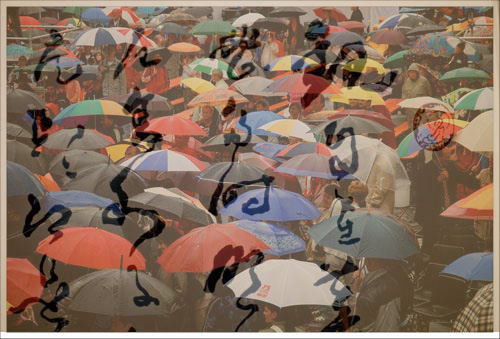The title ‘Grand Central Station’ should be enough to understand why avoiding such a place in one of the largest cities in the world, not to mention during the holiday season at rush hour, is sound advice. Unfortunately, I did not take such advice and found myself amidst a slew of clacking feet, all walking with determined faces and a gait of unrelenting momentum. Grand Central’s corridors receive an ‘A’ for creating echo, and in addition to the thousands of high-heels entering my ear canals, the noise of several bands tucked away in their little niches at the station, took the sensory-experience past its peak of endurance. I zigzagged in and out of on-coming human traffic, trying to find pockets of space to squeeze my body and my Spiderman book bag into, and made it out into the street…but that didn’t really help. Did I mention it was pouring down rain outside?

As I hid in a corner on 42nd street for five minutes, trying to give my brain time to focus on its surroundings, my eyes settled upon a little man waving papers in the air and shouting one phrase over and over. I could not understand what he was saying (I later realized it was the name of the paper, go figure), but I immediately sympathized with his having to sit there all night on this overwhelmingly busy street, as people barreled through the entrance of the station. He seemed quite composed uttering, “Post news journal!” time and time again, and I began thinking about the hours and days he may put into this one sentence. I wondered how his mind was reacting to this lengthy and repetitive act of declaration? After finally collecting myself, I turned the corner and once again encountered another man repeating a phrase; this time, however, the man was pacing back and forth, singing about umbrellas: “umbrellas, umbrellas, umbrellas, don’t get wet, watching people get wet, umbrellas…” He too, seemed very calm and steady like the paper man, and I wondered if their repetitive utterances had anything to do with it.
These two occurrences left me reflecting on the nature of mantras: can a ‘secular’ phrase be treated in similar ways to that of a mantra used by faith practitioners? Is there a difference in intention that must be addressed? In reading an article in Tricycle on mantras, taken from a talk by Nakagawa Soen Roshi, I learned that the literal meaning of ‘mantra’ comes from the Sanskrit roots ‘man’, meaning ‘to think’ and ‘tra’, meaning ‘tool’. Nakagawa states that mantras are ‘tools for thinking’, so that one can “purify and focus the mind, to offer devotion or thanks, and to protect and nurture the spiritual activity of a particular person or place.” I cannot say whether the two men outside of Grand Central necessarily had any of these things on their mind; it also may be possible that they were bored as hell and able to block out all of the city noise, which is why they seemed so composed amidst the bustle. I’m pushing for another reason, however, that the repetitive sound of their statements helped them to transcend any chaos or mundanity such positions held for them.
One may raise doubts as to whether a phrase may be called a ‘mantra’ if it is not a traditionally sacred and linguistically meaningful expression (Krishnamurti expresses doubt here regarding mantras.) Can a mantra really be effective as a meditative tool if it has no sacredness attached to it, no historical significance or tradition? Similarly, is a mantra valid in so far as it relies solely on the sound of its utterance, whereby surpassing any need for comprehension of the words said? In an article in Tricycle about the Heart Sutra, scholar Donald Lopez explains the significance of leaving the sutra in its original Sanskrit (or Chinese, which is debatable):
“….yet they left the mantra untouched by translation and the apparent limitation that that would entail, leaving the mantra unreconciled with the tongue of the reader but protected as sound, a sound that communicates nothing (except to those really smart bodhisattvas). It maintains its potency by eluding any conventional comprehension of its meaning. It works like magic.”
So a mantra can still act as a ‘thinking tool’ despite the reader’s acknowledgement of its meaning. Does this qualify our ‘Grand Central men’ as uttering mantras? Maybe not, because they were trying to get walker-bys to purchase a product; but on a personal level, I am still curious as to how these repetitive phrases affected their own minds. I’m not in any way trying to place the historical and religious significance of phrases such as ‘Om Mani Padmi Hum’ and ‘Gate, gate, paragate, parasamgate, bodhi svaha’ on the same level as ‘umbrella, umbrella, umbrella’ and ‘post news journal’, but I think the idea of secular mantras is fascinating, and I would like you all to help me flush this idea out further! Do these street vendors have the potential to develop steady minds through meaningless phrases? If so, do these meaningless phrases in turn become meaningful? Maybe next time I’m in Grand Central feeling overwhelmed, I’ll start uttering “umbrella, umbrella…”.
Image: Layered Umbrellas and Prajna
-‘Yellow Umbrella’ image courtesy of Michael Backhaus
-‘Prajana Paramita Sutra image courtesy of Wade M
Thank you for subscribing to Tricycle! As a nonprofit, we depend on readers like you to keep Buddhist teachings and practices widely available.